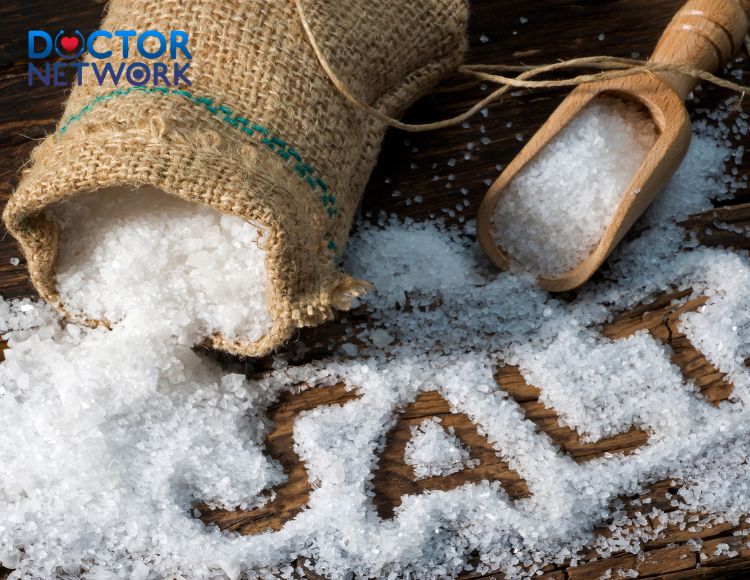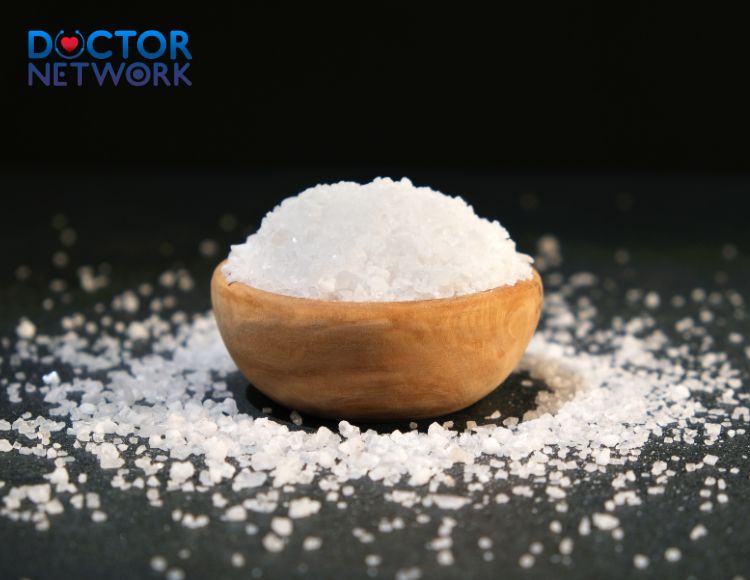Scalp fungus, though not dangerous, can cause uncomfortable itching and unsightly scalp flaking. The method of “treating scalp fungus with salt” is a widely shared folk remedy. But is salt truly that “miraculous”? This article will provide a clearer perspective.
Understanding Scalp Fungus
Scalp fungus (medically known as tinea capitis) is a scalp infection caused by dermatophyte fungi. Symptoms include:
- Itchy scalp that worsens with scratching
- Round patches of scaly, peeling skin
- Hair loss in patches, possibly leaving scars
- Swollen lymph nodes and mild fever in some cases
Scalp fungus spreads through direct contact or sharing items with an infected person (combs, hats, etc.).
Treating Scalp Fungus with Salt: Mechanism and Effectiveness
Salt (sodium chloride) has mild antiseptic properties, helping to clean the scalp and potentially inhibit some microorganisms.
- Expert Consultation – treating scalp fungus with salt: There is limited scientific research confirming that salt can definitively cure scalp fungus. Dermatologists may recommend using saline solutions with appropriate concentrations as a supportive treatment for mild fungus, helping to reduce itching.

There is limited scientific research confirming that salt can definitively cure scalp fungus
Pros and Cons of Treating Scalp Fungus with Salt
- Pros – pros of treating scalp fungus with salt: Easily accessible, inexpensive, and simple to apply
- Cons – cons of treating scalp fungus with salt: Effectiveness is not well-documented, cannot eradicate stubborn fungal strains, and improper use may irritate the already damaged scalp.
How to Treat Mild Scalp Fungus with Salt
Preparation: Fine sea salt, warm water, and clean utensils.
Steps:
- Dissolve 2-3 tablespoons of salt in 1 liter of warm water.
- Wash your hair and pat it dry.
- Gently wash your scalp with the saltwater, massaging it in.
- Leave it on for about 15 minutes, then rinse thoroughly.
- Repeat 2-3 times a week.
Important Notes When Treating Scalp Fungus with Salt
- Consult a dermatologist. Self-treatment at home may worsen or prolong the condition.
- Stop immediately if the scalp becomes irritated, red, or itchier.
- Do not use salt if there are open wounds on the scalp.

Do not use salt if there are open wounds on the scalp
Combining Treatment and Prevention
To effectively treat scalp fungus, besides using salt (if suitable), you should:
- Use prescribed antifungal medications (oral or topical)
- Clean the scalp thoroughly, avoiding vigorous washing
- Avoid wearing hats or hair towels when damp
- Do not share personal items
- Boost your immune system
Frequently Asked Questions about Treating Scalp Fungus with Salt
Here are frequently asked questions about “treating scalp fungus with salt“:
- Can you wash your hair with saline if you have scalp fungus?
- You can use diluted saltwater for mild scalp fungus. Salt has mild antiseptic properties that help clean the scalp and temporarily reduce itching. However, consult a dermatologist, especially if you have a sensitive scalp.

Salt has mild antiseptic properties that help clean the scalp and temporarily reduce itching
- Can salt cure scalp fungus?
- Salt cannot definitively cure scalp fungus. Its effectiveness depends on the type of fungus, the severity of the condition, and other combined treatments. You need specialized antifungal medications prescribed by a doctor.
- Are there other home remedies for scalp fungus besides salt?
- Other natural ingredients reputed to help with scalp fungus include:
- Lemon: Mild antiseptic due to its acidic nature
- Aloe Vera: Soothes the scalp
- Coconut Oil: Has antifungal properties (refer to scientific research)
- Note: Home remedies are only supportive and do not replace prescribed antifungal treatments.
- Other natural ingredients reputed to help with scalp fungus include:
- Does treating scalp fungus with salt cause hair loss?
- Scalp fungus itself causes hair loss. Using saltwater at the appropriate concentration generally does not increase hair loss. However, if your sensitive scalp reacts to the salt, it could lead to inflammation, weakening the hair roots.
- Are there side effects to treating scalp fungus with salt?
- Potential side effects include:
- Dry scalp and frizzy hair if the salt concentration is too high
- Scalp irritation, redness, increased itching (especially if there are open wounds)
- Discontinue use if any adverse reactions occur.
- Potential side effects include:
Scientific Evidence on Treating Scalp Fungus with Salt
- Antibacterial Properties of Salt:
- Salt can inhibit the growth of certain bacteria and fungi.
- In vitro research by Tehran University of Medical Sciences (2013) showed that 0.9% NaCl solution effectively killed Malassezia furfur, a common fungus causing dandruff and scalp fungus.
- Cleansing Properties of Salt:
- Salt helps remove dirt, sebum, and dead skin cells from the scalp, promoting a healthier environment.
- Safety of Salt Use:
- Salt is safe, easy to find, and inexpensive.
However:
- The effectiveness of salt in treating scalp fungus is limited, requiring more clinical studies.
- Saltwater should be used as a supportive measure, not a replacement for professional fungal treatments.
Treating scalp fungus with salt can be a supportive method for mild cases, helping to clean and reduce itching. However, the most crucial step is consulting a dermatologist for accurate diagnosis and treatment to avoid severe complications.
References:
https://www.ncbi.nlm.nih.gov/pmc/articles/PMC3774562/
Kiểm Duyệt Nội Dung
More than 10 years of marketing communications experience in the medical and health field.
Successfully deployed marketing communication activities, content development and social networking channels for hospital partners, clinics, doctors and medical professionals across the country.
More than 6 years of experience in organizing and producing leading prestigious medical programs in Vietnam, in collaboration with Ho Chi Minh City Television (HTV). Typical programs include Nhật Ký Blouse Trắng, Bác Sĩ Nói Gì, Alo Bác Sĩ Nghe, Nhật Ký Hạnh Phúc, Vui Khỏe Cùng Con, Bác Sỹ Mẹ, v.v.
Comprehensive cooperation with hundreds of hospitals and clinics, thousands of doctors and medical experts to join hands in building a medical content and service platform on the Doctor Network application.

























